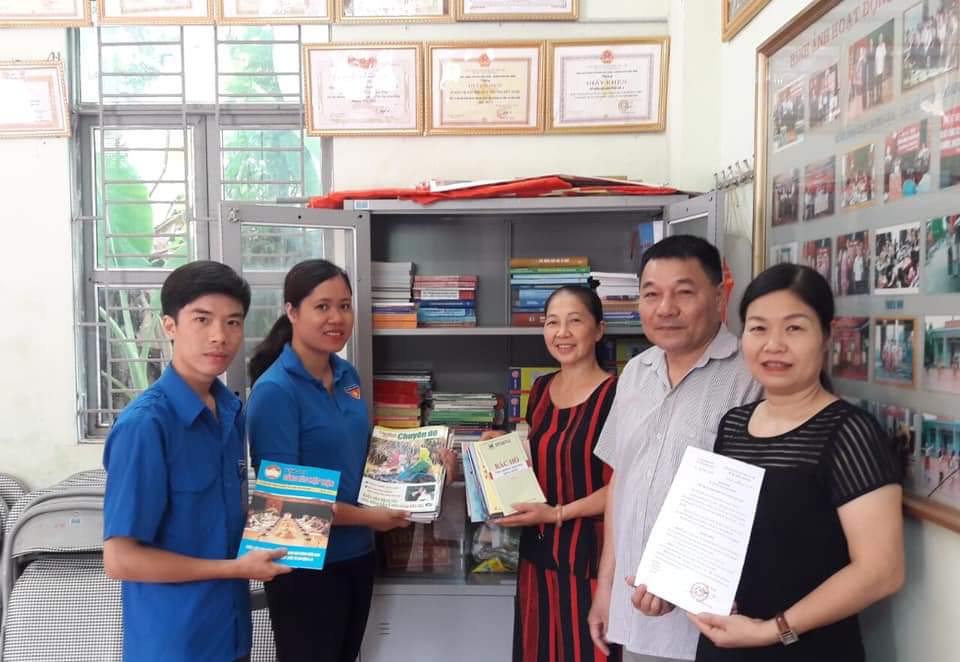
(HBO) - Over the past years, the culture, sports and tourism sector has made recommendations to the provincial administration in issuing directions, mechanisms and policies on the building of a healthy cultural environment, starting with the maintenance of the movement "All people unite in building a cultured lifestyle” in association with the new-style countryside and civilised city development.
 Staff of
the community-based learning centre and young people in Huu Nghi ward of Hoa
Binh city have collected books and newspapers for cultural centres of local
residential areas so as to encourage the reading habit.
Staff of
the community-based learning centre and young people in Huu Nghi ward of Hoa
Binh city have collected books and newspapers for cultural centres of local
residential areas so as to encourage the reading habit.All-level authorities and sectors have boosted communications
campaigns so as to promote people, civil servants and public employees’
awareness and effective implementation of activities to develop "cultured
families”, "cultured villages”, and "cultured agencies, units and businesses”.
District-level localities in Hoa Binh province
have paid heed to multiplying the models of cultured families, villages and
residential areas, stepping up the practice of a civilised lifestyle,
environmental protection and eradication of social crimes, and bringing into
play grassroots democracy. Some have developed such models as "self-managed
groups of families”, "self-managed alleys”, "self-managed streets”, and
"self-managed clans”. Besides, agencies, sectors and organisations have applied
codes of conduct to their cadres, civil servants, public employees, and staff.
As a result, the campaign of building cultured
families, villages, residential areas, and agencies has been expanding. In
2019, 83.8 percent of families across the province were recognised as "cultured
families” while 85.2 percent of villages and residential areas and 94 percent
of agencies and businesses met standards for cultured lifestyle.
To have a healthy society, building sustainable
and happy families which are the vital cell of society is also of critical
importance. So far, 1,657 clubs of "Developing sustainable families” in Hoa
Binh province have been set up, creating platforms for members to share
experience to help build progressive, happy, and sustainable families.
Additionally, the upholding of families and
clans’ fine traditions has also received due attention. In the movement of
developing "cultured families”, a number of exemplary families have been
honoured such as those of Nguyen Quang Canh in Dong Tam commune (Lac Thuy
district), Dinh Duc Ban in Hop Phong commune (Cao Phong district), Ly Sinh Toan
in Tu Son commune (Kim Boi district), and Bui Quang Ngoan in Mong Hoa commune
(Hoa Binh city).
To further improve people’s living standards,
authorities have also developed such facilities as cultural centres, sports
grounds, libraries, and equipment for joint activities which are hoped to
attract locals to healthy cultural activities and prevent toxic culture./.
Phong Phu commune, Tan Lac district of Hoa Binh province, is widely regarded as the cultural heartland of the Muong ethnic group. Among its many traditional communities, Luy Ai hamlet (formerly Ai hamlet) stands out as a rare location where the customs and way of life of the Muong Bi people remain largely intact.
The Truong Kha temple festival, a distinctive cultural event held every three years in Vu Ban township, Lac Son district, returned recently with vibrant rituals and folk traditions of the Muong people. Located next to the Buoi River in the Muong Trao fields, the Truong Kha Temple is dedicated to the three Kun Dol deities, revered for teaching farming techniques, irrigation, weaving, and protecting the harvest.
The demand for spaces serving community activities of residents in various areas across Hoa Binh city has been satisfied as local cultural houses now feature modern, spacious facilities thanks to the effective implementation of Resolution No. 49/NQ-HDND issued on December 28, 2021 by the city People's Council, which approved the plan for reorganising, converting, and allocating land for the construction, repair, and expansion of cultural houses in Hoa Binh’s villages and residential areas until 2025.
At the end of May, the Hoa Binh Provincial Ethnic Arts Troupe organized a series of performances for residents in Region 2 and Region 3 communes across the province. Bringing art to ethnic communities in remote, isolated, and especially disadvantaged areas has become a meaningful activity. These are not merely artistic performances but also journeys to disseminate cultural values, enrich spiritual life, and contribute to preserving the cultural identity of ethnic minorities.



 Staff of
the community-based learning centre and young people in Huu Nghi ward of Hoa
Binh city have collected books and newspapers for cultural centres of local
residential areas so as to encourage the reading habit.
Staff of
the community-based learning centre and young people in Huu Nghi ward of Hoa
Binh city have collected books and newspapers for cultural centres of local
residential areas so as to encourage the reading habit.